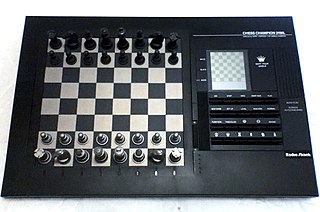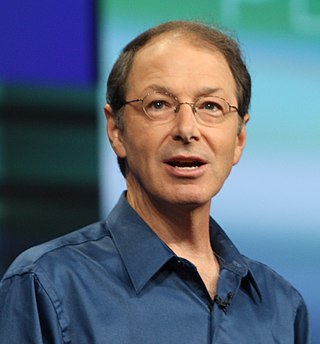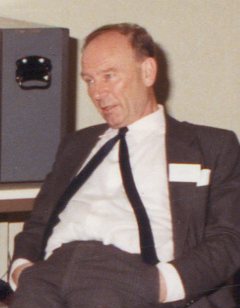
Reversi is a strategy board game for two players, played on an 8×8 uncheckered board. It was invented in 1883. Othello, a variant with a fixed initial setup of the board, was patented in 1971.

Computer chess includes both hardware and software capable of playing chess. Computer chess provides opportunities for players to practice even in the absence of human opponents, and also provides opportunities for analysis, entertainment and training. Computer chess applications that play at the level of a chess grandmaster or higher are available on hardware from supercomputers to smart phones. Standalone chess-playing machines are also available. Stockfish, Leela Chess Zero, GNU Chess, Fruit, and other free open source applications are available for various platforms.

The UCPH Department of Computer Science is a department in the Faculty of Science at the University of Copenhagen (UCPH). It is the longest established department of Computer Science in Denmark and was founded in 1970 by Turing Award winner Peter Naur. As of 2021, it employs 82 academic staff, 126 research staff and 38 support staff. It is consistently ranked the top Computer Science department in the Nordic countries, and in 2017 was placed 9th worldwide by the Academic Ranking of World Universities.

Jonathan Herbert Schaeffer is a Canadian researcher and professor at the University of Alberta and the former Canada Research Chair in Artificial Intelligence.

The School of Informatics is an academic unit of the University of Edinburgh, in Scotland, responsible for research, teaching, outreach and commercialisation in informatics. It was created in 1998 from the former department of artificial intelligence, the Centre for Cognitive Science and the department of computer science, along with the Artificial Intelligence Applications Institute (AIAI) and the Human Communication Research Centre.
Robert Morgan Hyatt is an American computer scientist and programmer. He co-authored the computer chess programs Crafty and Cray Blitz which won two World Computer Chess Championships in the 1980s. Hyatt was a computer science professor at the University of Southern Mississippi (1970–1985) and University of Alabama at Birmingham (1988–2016).
Logistello is a computer program that plays the game Othello, also known as Reversi. Logistello was written by Michael Buro and is regarded as a strong player, having beaten the human world champion Takeshi Murakami six games to none in 1997 — the best Othello programs are now much stronger than any human player. Logistello's evaluation function is based on disc patterns and features over a million numerical parameters which were tuned using linear regression.
Microsoft Research (MSR) is the research subsidiary of Microsoft. It was created in 1991 by Richard Rashid, Bill Gates and Nathan Myhrvold with the intent to advance state-of-the-art computing and solve difficult world problems through technological innovation in collaboration with academic, government, and industry researchers. The Microsoft Research team has more than 1,000 computer scientists, physicists, engineers, and mathematicians, including Turing Award winners, Fields Medal winners, MacArthur Fellows, and Dijkstra Prize winners.

Richard Farris Rashid is the founder of Microsoft Research, which he created in 1991. Between 1991 and 2013, as its chief research officer and director, he oversaw the worldwide operations for Microsoft Research which grew to encompass more than 850 researchers and a dozen labs around the world.

Mitchel Resnick is LEGO Papert Professor of Learning Research, Director of the Okawa Center, and Director of the Lifelong Kindergarten group at the Massachusetts Institute of Technology (MIT) Media Lab. As of 2019, Resnick serves as head of the Media Arts and Sciences academic program, which grants master's degrees and Ph.D.s at the MIT Media Lab.

Donald Michie was a British researcher in artificial intelligence. During World War II, Michie worked for the Government Code and Cypher School at Bletchley Park, contributing to the effort to solve "Tunny", a German teleprinter cipher.

Michael Lederman Littman is a computer scientist, researcher, educator, and author. His research interests focus on reinforcement learning. He is currently a University Professor of Computer Science at Brown University, where he has taught since 2012.

Computer Othello refers to computer architecture encompassing computer hardware and computer software capable of playing the game of Othello. It was notably included in Microsoft Windows from 1.0 to XP, where it is simply known as Reversi.

Andrew Yan-Tak Ng is a British-American computer scientist and technology entrepreneur focusing on machine learning and artificial intelligence (AI). Ng was a cofounder and head of Google Brain and was the former Chief Scientist at Baidu, building the company's Artificial Intelligence Group into a team of several thousand people.
Nimrod Megiddo is a mathematician and computer scientist. He is a research scientist at the IBM Almaden Research Center and Stanford University. His interests include combinatorial optimization, algorithm design and analysis, game theory, and machine learning. He was one of the first people to propose a solution to the bounding sphere and smallest-circle problem.

The Joan Ganz Cooney Center is an independent, non-profit, non-partisan research and innovation group founded by Sesame Workshop to advance children's literacy skills and foster innovation in children's learning through digital media.
In computer science, Monte Carlo tree search (MCTS) is a heuristic search algorithm for some kinds of decision processes, most notably those employed in software that plays board games. In that context MCTS is used to solve the game tree.
David Silver is a principal research scientist at Google DeepMind and a professor at University College London. He has led research on reinforcement learning with AlphaGo, AlphaZero and co-lead on AlphaStar.
Michael Genesereth is an American logician and computer scientist, who is most known for his work on computational logic and applications of that work in enterprise management, computational law, and general game playing. Genesereth is professor in the Computer Science Department at Stanford University and a professor by courtesy in the Stanford Law School. His 1987 textbook on Logical Foundations of Artificial Intelligence remains one of the key references on symbolic artificial intelligence. He is the author of the influential Game Description Language (GDL) and Knowledge Interchange Format (KIF), the latter of which led to the ISO Common Logic standard.
DeepStack is an artificial intelligence computer program designed to play two-player poker, specifically heads up no-limit Texas hold 'em. It is the first computer program to outplay human professionals in this game.











